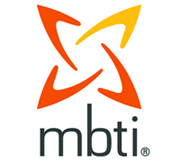Using MBTI® Type to Foster Individual Development
Using MBTI® Type to Foster Individual Development
Remember: While every type has its unique combination of assets, each is also subject to a downside due to potential overuse or rigidity. Continue to leverage your strengths and the strengths of others but seek opportunities to address developmental needs and grow professionally.
- To Extraverts: “Practice Introversion by counting to 10 when you’re feeling especially action-driven or enthusiastic, or reflecting on ideas and plans to fully consider them before acting.”
- To Introverts: “Practice Extraversion by soliciting input from others and seeking assistance with formulating plans, even if you prefer to approach the task independently.”
- To Sensing types: “Practice Intuition by creating a one- to two-page executive summary describing the trends or patterns suggested by the data under consideration.”
- To Intuitive types: “Practice Sensing by using precise, accurate details in a report or project that you don’t believe merits such information.”
- To Thinking types: “Practice Feeling by moving outside your normal range of conversational topics to share some personal facts, details, or insights about yourself.”
- To Feeling types: “Practice Thinking by purposely giving simple, direct, and concise feedback to others.”
- To Judging types: “Practice Perceiving by scheduling one day a month at work to “go with the flow” and noting any value that such flexibility brings.”
- To Perceiving types: “Practice Judging by determining what daily tasks you could do consistently and then developing a routine and sticking to it.”
-
- What behaviors would you like to start, and how might you begin making small steps toward making the requisite changes?
- How might you track your progress to determine what new behaviors or approaches are making a positive impact? Now, consider your own type preferences and how they relate to the way you approach your daily tasks and progress toward your professional goals.
Source: Adapted from Hirsh and Kise, Introduction to Type® and Coaching (1998), pp. 13–14, www.cpp.com
More From Michele
Personality Type & Relationships- ISFP
Personality Type & Relationships ISFP The Artists ISFPs tend to: be warmhearted, gentle, and private people like nature, sports and animals want to please their partner and children large capacity for sympathy for others have difficulty communicating when...
Personality Type & Relationships- INFP
Personality Type & Relationships INFP The Idealists INFPs tend to: be a calm, pleasant face to the world feel his or her life intensely, while appearing to be tranquil and peaceful to others, with simple desires desire harmony, dislike conflict & try to avoid...
Personality Type & Relationships-ESFP
Personality Type & Relationships- ESFP ESFP The Performers ESFPs tend to: be realistic and spontaneous desire positive feedback from partners social and can improve the mood of the party just by being there be warm & loving without expecting it in return love...




